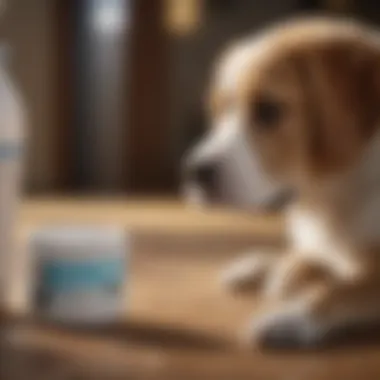What to Give My Puppy with Diarrhea: A Guide


Intro
Diarrhea is a common issue faced by many puppy owners. Young dogs, due to their developing digestive systems, can experience this condition for various reasons. As a pet owner, understanding how to care for a puppy with diarrhea is crucial. In this section, we will analyze what you can give your puppy to help alleviate their discomfort.
Understanding Your Pet
Puppy Sensitivity
Puppies are often sensitive creatures. Their digestive systems are still maturing, which can lead to fluctuations in bowel movements. Knowing the specific needs of your puppy's breed can provide insight into their dietary requirements. For example, certain breeds may be more prone to gastrointestinal issues than others. Paying attention to these traits can help guide your choices.
Common Causes of Diarrhea
There are multiple reasons why puppies might develop diarrhea. These can include:
- Dietary changes
- Infections (viral or bacterial)
- Parasites
- Stressful situations
Recognizing the underlying cause can also inform your care approach.
Special Needs of Puppies
Some puppies may have specific dietary restrictions based on their breed or health concerns. For example, a puppy with food allergies will require a tailored diet that avoids allergens. Always observe your puppy's reactions to any new food and consult a veterinarian when in doubt.
Nutrition and Feeding Guidelines
Choosing the Right Diet
When a puppy has diarrhea, choosing an appropriate diet can be vital. A bland diet may help soothe an upset stomach. Common recommendations include:
- Boiled chicken (no skin or bones)
- White rice
- Plain pumpkin (not the spiced pie filling)
These foods are gentle on the stomach and can help bind stools back together. It's important to gradually reintroduce their regular diet after the diarrhea subsides, monitoring for any return of symptoms.
Hydration is Key
Puppies can lose a significant amount of fluids during episodes of diarrhea. Ensure that your puppy has constant access to fresh water to stay hydrated. In some cases, adding electrolytes specifically designed for pets could be beneficial. Always follow your veterinarian's advice regarding hydration.
When to Consult a Veterinarian
If diarrhea persists for more than a day or is accompanied by other symptoms such as vomiting, lethargy, or blood in the stool, seeking veterinary assistance is essential. A vet can perform necessary tests to determine the underlying cause and prescribe treatment, if required.
Consult your vet if you notice signs of dehydration, such as dry gums or excessive panting.
Ending
Understanding your puppy's digestive health is vital for their overall well-being. By being mindful of their diet and hydration, you can help ease discomfort during episodes of diarrhea. Always monitor your pet’s health closely and remember that timely veterinary intervention can prevent more serious health issues.
Understanding Diarrhea in Puppies
Recognizing and addressing diarrhea in puppies is crucial for pet owners. This condition is not just an inconvenience; it can indicate underlying health issues. Puppies, due to their developing immune systems and curious nature, are more susceptible to gastrointestinal problems. Understanding this condition is essential for optimal health management.
Definition and Symptoms of Diarrhea
Diarrhea in puppies generally refers to increased frequency of bowel movements, resulting in loose or watery stools. It can vary in severity from mild to severe. Common symptoms include:
- Increased urgency to defecate
- Stools that are watery or diarrhea-like
- Possible blood or mucus in the stool
- Abdominal discomfort or bloating
- Accompanying symptoms like vomiting or lethargy
If you observe these symptoms in your puppy, it is important to monitor their condition closely as it may lead to dehydration.
Common Causes of Diarrhea


Several factors may contribute to diarrhea in puppies. Some of the most common causes include:
- Dietary indiscretion: Puppies often eat things they shouldn't, leading to digestive upset.
- Infections: Bacterial, viral, or parasitic infections can cause severe diarrhea.
- Food allergies: An adverse reaction to certain ingredients may manifest as diarrhea.
- Environmental changes: Moving to a new home or changes in routine can upset a puppy's stomach.
- Sudden diet changes: Switching dog food suddenly may disturb the gastrointestinal balance.
Understanding these causes helps in preventing future incidents and addressing the issue promptly if it occurs.
When to Worry About Diarrhea
While occasional diarrhea may be harmless, certain signs indicate a more serious issue.
If diarrhea persists for more than a day, or if you see blood in the stool, consult a veterinarian.
Other worrisome signs include:
- Persistent vomiting
- Signs of dehydration, such as dry gums or loss of skin elasticity
- Lethargy or weakness
- Fever
Prompt attention to these symptoms is critical to ensure your puppy's well-being. Taking these steps allows you to provide the appropriate care, leading to better health outcomes for your furry companion.
Home Remedies for Puppy Diarrhea
Diarrhea in puppies can be distressing for both the pet and the owner. It disrupts their normal routine and can lead to further health complications if not managed properly. Home remedies offer a cost-effective and immediate approach to mitigate the discomfort and address this common problem.
When considering home remedies, remember they are often the first line of defense in mild cases. Moreover, they can be effective in stabilizing a puppy's condition before seeking professional help. It is essential to recognize that these methods may not replace veterinary care when diarrhea is severe or persistent. Hence, understanding how to implement these remedies correctly is crucial.
Fasting Recommendations
When a puppy has diarrhea, fasting may be beneficial. A short fasting period allows the gastrointestinal tract to rest and recover. Generally, fasting for about 12 to 24 hours is advisable, depending on the puppy's age, size, and overall health. This decision should not be taken lightly, and pet owners should monitor their puppy's condition during this time.
- Puppy Age: Young puppies, especially those under four months, require more frequent feeding. Fasting may not be suitable for them, so consult a veterinarian in such cases.
- Toy Breeds: Smaller breeds can become dehydrated rapidly. If your puppy falls into this category, fasting less than 12 hours may be sufficient.
Always ensure access to fresh, clean water during the fasting period to prevent dehydration.
Reintroducing Food
Once the fasting period is over, reintroducing food should be done cautiously. Gradually transition back to their regular diet. Start with small portions of a bland diet. This helps in assessing how well the puppy's digestive system can handle food after the fasting period.
A recommended approach includes:
- Initial Portion: Begin with about a quarter of the usual serving.
- Bland Diet Options: Suggested bland foods include:
- Boiled white rice
- Skinless boiled chicken
- Pumpkin puree
Observe your puppy closely while reintroducing food. If there is no worsening of symptoms, slowly increase the portions over the next few days.
Hydration Importance
Maintaining hydration is critical when a puppy has diarrhea. Diarrhea can lead to dehydration, which poses serious health risks. Therefore, providing an ample supply of fresh water is vital.
- Signs of Dehydration: Keep an eye out for symptoms such as lethargy, dry gums, or excessive thirst.
- Electrolyte Solutions: Products designed for pets can help restore lost electrolytes. These solutions are particularly useful if your puppy refuses to drink water. Opt for pet-safe formulations available at veterinary offices or pet stores.
Being proactive in managing hydration can be life-saving. As diarrhea often prevents proper nutrient absorption, ensuring your puppy remains hydrated is key to their overall recovery.
Remember: Always consult with a veterinarian if diarrhea persists beyond 24 hours, or if you observe severe symptoms. Your puppy's health should always be the top priority.
Dietary Adjustments for Diarrhea
Dietary adjustments play a significant role when addressing diarrhea in puppies. The right nutrition can support the healing process and restore normal digestive function. A carefully selected diet reduces the stress on a puppy's gastrointestinal system. This adjustment allows the intestines to recover while ensuring the pet still receives essential nutrients.
Bland Diet Recommendations


Rice and Chicken
Rice and chicken is a commonly recommended bland diet for puppies suffering from diarrhea. This combination is easy to digest and provides a gentle source of carbohydrates and protein. The key characteristic of rice is its low fiber content, which helps firm up stools. Chicken, on the other hand, is a lean protein that is also relatively easy on the stomach.
The unique feature of rice and chicken is that it mimics a puppy’s natural diet while ensuring that it does not irritate the digestive tract further. One significant advantage is its palatability; most puppies find it quite appealing. However, it is essential to avoid seasoning or adding any rich sauces, as this may aggravate the condition further.
Pumpkin as a Soothing Agent
Pumpkin serves as an effective soothing agent for puppies with diarrhea. It is high in soluble fiber, which can help stabilize the intestinal flora and absorb excess water in the stool. The key advantage of using pumpkin is its richness in vitamins and minerals, providing additional nutrients during a time when a puppy may not be eating much.
One unique feature of pumpkin is its natural sweetness, which makes it an attractive option for a distressed puppy. Incorporating pumpkin into a diet can be beneficial, and it is generally well-tolerated. A potential disadvantage could be that some puppies might require time to adjust to the new taste, but the benefits often outweigh this minor issue.
Low-Fat Cottage Cheese
Low-fat cottage cheese can also be a suitable dietary choice for puppies with diarrhea. Its low-fat content aids in easy digestion while offering a source of protein. The salient characteristic of cottage cheese is its calcium content, which may promote overall health during recovery.
Including low-fat cottage cheese in the diet provides unique benefits. It can introduce probiotic properties to the diet. However, some puppies might not be fond of the texture or taste. It's advisable to observe your puppy’s reaction to cottage cheese before making it a regular part of their diet.
Commercial Dietary Options
Prescription Diets
Prescription diets are specifically formulated to address digestive issues in puppies. These diets are typically rich in specific nutrients required for recovery. The key characteristic of prescription diets is their tailored composition, designed by veterinarians to meet the unique health needs of a puppy with diarrhea.
A literature review reveals that the controlled ingredients in these diets are beneficial. These diets minimize common allergens and provide a balance of nutrients essential for healing. However, the main disadvantage is the cost, and not all owners may find them immediately accessible.
Gastrointestinal Formulas
Gastrointestinal formulas offer a commercial dietary option for puppies experiencing diarrhea. They typically contain easily digestible ingredients that provide balanced nutrition while being gentle on the stomach. The main feature of these formulas is their prebiotic and probiotic content, which can help restore healthy gut bacteria.
The unique benefit of gastrointestinal formulas lies in their convenience and ready availability in stores. These formulas are designed for quick recovery. However, pet owners should be cautious; some formulas may not suit every puppy, hence consulting a veterinarian is advisable.
Supplementing Puppy Nutrition
Puppies, undergoing significant growth and development, have unique nutritional needs. When they experience diarrhea, it is crucial to address these needs carefully. Supplementing puppy nutrition is a critical step in ensuring that your young dog receives the appropriate nutrients for recovery and overall health. The right supplements can effectively promote healing and restore balance to their digestive system.
While managing diarrhea, it’s important to consider the impact on their hydration and nutrient absorption. Diarrhea can cause puppies to lose vital electrolytes and minerals. Thus, supplementing their diet during this time is not just a choice; it is a necessity.
Probiotics for Digestive Health
Probiotics are beneficial bacteria that support a healthy gut flora. They play an essential role in the digestive health of puppies. When dealing with diarrhea, introducing probiotics can help restore the balance of beneficial bacteria in the gut.
Studies show that probiotics can shorten the duration of diarrhea episodes. They also aid in the growth of good bacteria while inhibiting harmful ones. When selecting probiotics for puppies, look for products specifically designed for canine use, such as FortiFlora by Purina or Proviable by VetriScience.
Before starting any probiotic, consult your veterinarian to determine the right type and dosage for your puppy’s specific needs. This supplement can be a key factor in improving your puppy's digestion and overall health.
Electrolyte Solutions
When a puppy has diarrhea, dehydration is a significant concern. Fluid loss can lead to serious health risks if not addressed quickly. Electrolyte solutions can help replenish lost fluids and restore vital nutrients. These solutions typically contain essential electrolytes such as sodium, potassium, and chloride.
Products like Pedialyte can beAdministered to puppies, but it is critical to use them cautiously. Ensure to consult your veterinarian for guidance regarding the appropriate concentration and amount to give.
Providing an electrolyte solution helps to ensure that your puppy remains hydrated and receives the necessary minerals required for recovery. In addition to commercial products, consider offering a homemade solution with water and a pinch of salt to aid hydration.
Remember, while supplements can aid in recovery, they should not replace a veterinarian's assessment if the diarrhea persists.
In summary, supplementing your puppy’s nutrition during diarrhea involves targeting both gut health and hydration. Using probiotics can enhance digestive function, while electrolyte solutions play a significant role in maintaining fluid balance. Each option contributes to your puppy’s well-being during recovery and helps set the foundation for a healthy digestive system in the future.
Monitoring Your Puppy’s Condition


Monitoring your puppy's condition during an episode of diarrhea is crucial for several reasons. Puppies, due to their size and developmental stage, are particularly vulnerable to rapid changes in health. Diarrhea can lead to dehydration, a critical condition that requires immediate attention. Pet owners must be vigilant, observing their puppy's behavior, appetite, and overall demeanor. Regular monitoring helps identify any concerning trends early on, facilitating timely intervention if necessary.
Signs of Dehydration
Dehydration is a major risk when a puppy experiences diarrhea. Recognizing the signs is paramount in ensuring their health. Common indicators include:
- Loss of Skin Elasticity: Gently pinch the skin on the back of your puppy’s neck. If it does not return to its normal position quickly, dehydration may be present.
- Sunken Eyes: Examine your puppy’s eyes. If they appear sunken or dull, this is a worrying sign.
- Dry Gums: Check the moisture level in your puppy's mouth. Dry gums, along with a pale or sticky texture, suggest dehydration.
- Lethargy: If your puppy shows a lack of energy or enthusiasm, this could indicate that their body is struggling.
- Increased Heart Rate: An elevated heart rate can sometimes suggest stress or dehydration.
Being aware of these signs will help you take appropriate action before the situation escalates. It is essential to keep track of your puppy's water intake and urge them to drink water frequently.
Tracking Symptoms and Progress
Closely tracking your puppy’s symptoms and progress through diarrhea allows pet owners to gather vital information. This data is beneficial for veterinarians should a consultation become necessary. Here are some elements to track:
- Frequency of Diarrhea: Note how many times your puppy has episodes throughout the day.
- Consistency of Stool: Take note if the stool is watery, soft, or there are other concerning changes.
- Appetite Changes: Monitor whether there is a decrease in appetite or any reluctance to eat.
- Behavioral Changes: Observe your puppy for any unusual behavior such as hiding or excessive whining.
- Hydration Levels: Keep an eye on water intake and normalize urination patterns.
By documenting these details, pet owners can provide a comprehensive overview of their pup's condition to their veterinarian, allowing for a more accurate assessment and treatment plan appropriate to their needs.
Regular monitoring is not just a good practice; it can be the key to preventing more severe health issues down the line.
When to Consult a Veterinarian
When your puppy experiences diarrhea, it can be concerning for any pet owner. While some cases can be managed at home, there are instances where veterinary intervention is crucial. Knowing when to consult a veterinarian can make a significant difference in your puppy's health and recovery.
It's essential to understand that diarrhea can be a symptom of various underlying issues. These can range from minor gastrointestinal disturbances to severe illnesses. The sooner you identify and address these symptoms, the better the chances of a positive outcome. Many pet owners express hesitation to seek professional help. However, recognizing when professional treatment is necessary is key to ensuring your puppy's well-being.
Identifying Severe Symptoms
To determine if your puppy requires immediate veterinary care, look for signs that indicate a serious condition. Severe symptoms include:
- Persistent diarrhea lasting more than 24 hours.
- Blood in the stool or black, tarry stools, indicating possible internal bleeding.
- Vomiting, especially if it occurs frequently or is accompanied by diarrhea.
- Lethargy or unresponsiveness. This might signal dehydration or another serious issue.
- Loss of appetite for one day or more can indicate that your puppy is not feeling well.
- Signs of dehydration, such as dry gums, excessive thirst, or skin that doesn’t bounce back when pinched.
Monitoring these symptoms closely can help differentiate between a manageable case and one that demands urgent attention.
Questions to Ask Your Veterinarian
Before visiting the veterinarian, prepare a list of questions to ensure you gather all the necessary information. Some important queries include:
- What could be causing my puppy's diarrhea? Understanding potential triggers can help address dietary or other concerns.
- What tests might be needed? Knowing this ahead of time can prepare you for additional procedures.
- What immediate care can I give at home? This can add clarity to your treatment approach after leaving the clinic.
- Is there a specific diet recommended? Your vet can provide tailored advice based on their assessment.
- When should I return for follow-up? This ensures continued monitoring of your puppy’s condition.
Engaging thoughtfully with your veterinarian can streamline the recovery process and provide peace of mind during a troubling time for you and your puppy.
Closure and Care Tips
Understanding how to care for a puppy with diarrhea is vital for ensuring their health. This conclusion synthesizes the key points discussed throughout the article and emphasizes the importance of proper care. Owners must recognize that diarrhea can be a symptom of various issues, some of which may require immediate veterinary attention. Timely intervention can prevent further complications and keep the puppy's health on track.
Implementing preventive measures can significantly reduce the likelihood of future digestive issues. Regular monitoring of the puppy's condition allows for a prompt response to any changes in their health. Therefore, maintaining a careful watch over your puppy's eating habits and environment is crucial. Educating oneself about proper puppy nutrition plays an essential role in nurturing their digestive health.
Preventive Measures for Future Issues
Preventive measures are focused strategies aimed at minimizing the occurrence of diarrhea in puppies. Consider the following steps:
- Routine Veterinary Check-ups: Regular vet visits ensure that any underlying health problems are addressed early.
- Quality Diet: Feeding high-quality dog food specifically formulated for puppies can help maintain a healthy gut.
- Gradual Food Changes: Anytime you introduce new food, make the transition gradual to avoid digestive upset.
- Avoid Table Scraps: Human food can be rich and hard for puppies to digest. Stick to puppy-specific treats.
Establishing a consistent feeding schedule also aids in regulating their digestive system.
Nurturing Your Puppy’s Digestive Health
Promoting optimal digestive health in puppies is a long-term commitment and can involve several components:
- Probiotics: These can help restore balance in the gut flora, especially if diarrhea has occurred. Check with your vet for suitable products.
- Hydration: Always ensure your puppy has access to fresh water. Dehydration can be a serious concern during bouts of diarrhea.
- Bland Diet Transition: If your puppy has diarrhea, a transition to bland foods, such as boiled chicken and rice, can help stabilize their digestion.
- Monitor Changes: Observing changes in their stool and general behavior will provide insights into their digestive health.
Investing time and effort into understanding and nurturing your puppy's digestive health pays off significantly in the long run. Many health issues can stem from improper care, highlighting the need for informed choices.
By following these care tips, your puppy can enjoy a healthier digestive system, leading to a happy, vibrant companion.



